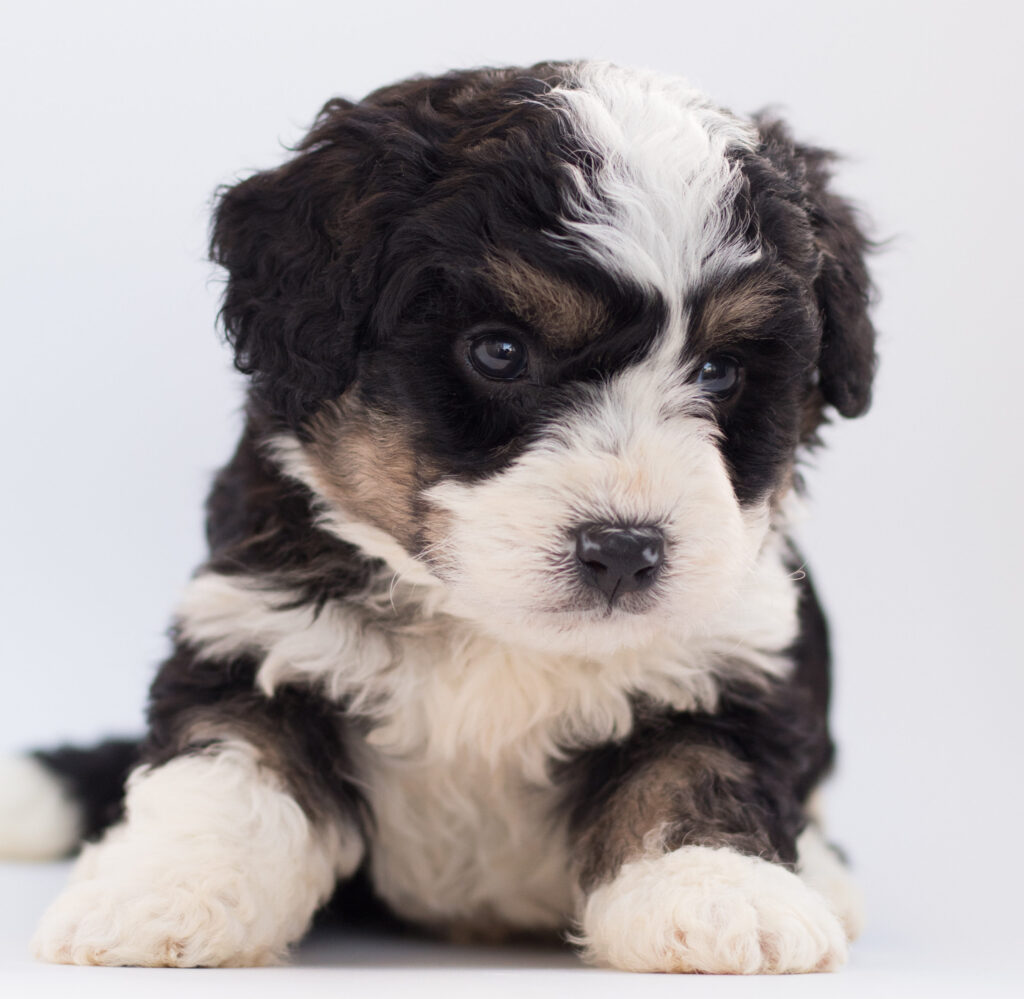
Many Bernedoodle owners wonder how male Bernedoodles compare to females. What do they have in common? And perhaps more importantly, what are their differences?
Maybe you’re thinking of acquiring a Bernedoodle of your own, or perhaps you’re just curious about their biological differences. In this article, we’ll compare and contrast the behavior, physical traits and potential health issues of male and female Bernedoodles.
Male vs Female Bernedoodles: At a Glance
There are some characteristics that are shared by both male and female Bernedoodles. In other respects, there is stark contrast between them.
Let’s examine some of the similarities and differences between boy and girl Bernedoodles.
Similarities
Traditionally, all Bernedoodles descend from a Bernese Mountain Dog and a poodle. Female and male Bernedoodles are similar in many ways because they share the instincts, behavior and personality of their parent breeds.
Many Bernedoodle owners note that their dog is great with children and other pets. They are typically calm and easy-going, but can be protective of their family. These characteristics are likely inherited from the Bernese Mountain Dog.
By the same token, Bernedoodles are notorious for their intelligence and their cuddly nature. These might be passed down from their poodle parent.
There are many physical similarities as well. For example, due to their poodle ancestry, Bernedoodles have a short, curly coat that rarely sheds. This means that Bernedoodles are generally hypoallergenic and should have their coat brushed to prevent matting and tangling.
Can Bernedoodles Have Babies?
Like all breeds and crossbreeds, female Bernedoodles can get pregnant and give birth to babies. This may be the most important difference if you are deciding whether to purchase a male or female.
Are you interested in selling or caring for a Bernedoodle’s offspring? If not, you should either purchase a male or prepare to have your female dog spayed to prevent pregnancy.
Breeding Considerations
If you are acquiring a Bernedoodle for breeding purposes, there are some obvious points to consider when choosing a male or female.
If you prefer natural breeding (i.e. allowing the dogs to physically mate), you will need at least one male and one female. If you can only obtain a male Bernedoodle, you will need to make arrangements with an owner of a female.
However, if you are open to performing artificial insemination, you technically only need to acquire a female Bernedoodle.

Male Bernedoodles
Male Bernedoodles are lovable, lively, and sometimes downright hilarious. In this section, we’ll discuss some traits that are unique to males.
Behavior
There is a wide range of opinion on Bernedoodle personality. Anecdotally, males tend to be more sociable and easygoing than females. But many other Bernedoodle owners claim that they notice no correlation with personality.
Perhaps the most noticeable behavioral difference is aggression. Male Bernedoodles are more likely to bite. You can help reduce your dog’s aggression by having him neutered, assuming that you do not intend to pursue breeding.
Physical Traits
Male Bernedoodles tend to be a bit larger and heavier than females, but they are still considered a medium-to-large-sized crossbreed.
Fully grown standard male Bernedoodles weigh between 70 and 90 pounds on average. They stand 23 to 29 inches high when measured at the shoulder.
If you keep your male Bernedoodle healthy, you can expect them to live 12 to 18 years.
Health
There are some health considerations that apply specifically to male Bernedoodles.
Males have a prostate gland near the urinary bladder. They are susceptible to prostatic disease such as prostate cancer and paraprostatic cysts. If your dog is straining to urinate, have a licensed veterinarian check him for prostatic disease so that he can be treated if necessary.
Older male Bernedoodles can also develop testicular cancer. In some cases, this cancer is treatable. Once it spreads, however, it is more likely to be fatal.
Note that neutering your Bernedoodle will significantly reduce his chances of developing these medical issues. If you choose to own a male puppy, discuss neutering options as soon as possible with your veterinarian.
Female Bernedoodles
Female Bernedoodles are sweet, snuggly pals that bring so much joy to their owners. Let’s take a look at what makes them so special.
Behavior
As we saw with male Bernedoodles, female behavior reports are anecdotal. There is little evidence to support the theory that there are significant personality differences between girl and boy Bernedoodles.
However, many owners do report that their female Bernedoodles are more mature and serious, particularly at a younger age. They are also known to be extra-protective of their chosen people and less clingy than males.
If you plan to own two Bernedoodles, it is recommended to choose one male and one female. Male dogs tend to get along better with females, and vice versa.
Physical Traits
If your are looking for a Bernedoodle to purchase or adopt, you will likely find that females are slightly smaller and lighter than males.
When standing upright, female standard Bernedoodles are between 20 and 27 inches tall at the shoulder. They weight between 60 and 80 pounds.
Like boy Bernedoodles, the girls enjoy a relatively healthy lifespan of 12 to 18 years.
Health
Bernedoodles are generally a healthy crossbreed, but some medical problems are experienced only by females.
One of these conditions is pyometra. This is an infection in the dog’s uterus that is caused by hormonal changes. After the female Bernedoodle goes through heat (estrus), high levels of progesterone can thicken the uterus lining. This is normal, but if the dog does not become pregnant after multiple cycles, the thickened lining may allow for the growth of cysts and bacterial infection.
Female Bernedoodles are also at risk for developing mammary tumors. This occurs when cells in the dog’s breast tissue replicate abnormally. These tumors are not always cancerous, but they should be considered as a risk when choosing between a male and female Bernedoodle.
Both pyometra and mammary tumors can be mostly prevented by having your Bernedoodle spayed. This involves the removal of the uterus and ovaries and is recommended by veterinarians in most cases.

FAQ
Can Bernedoodles breed with Bernedoodles?
Yes, Bernedoodles can breed with other Bernedoodles. Some purists may insist that a true Bernedoodle must be the child of a Bernese Mountain Dog and a poodle, but a puppy with two Bernedoodle parents is perfectly acceptable for many pet owners.
In fact, a Bernedoodle can be bred with any other dog. Some owners even breed Bernedoodles with one of their ancestor breeds (Bernese Mountain Dog or poodle).
The general rule is to make sure the male is smaller than the female. The prevents the female from being pregnant with a pup that her smaller body cannot deliver.
What are some good male Bernedoodle names?
Naming a pet is a very subjective process that depends on your personal taste and cultural background. However, many Bernedoodle owners tend to choose names that complement the Bernedoodle’s cute and playful nature. Here are a few of our favorite names for male Bernedoodles.
- Pebble
- Milo
- Peanut
- Otis
- Teddy
- Chipper
- Duke
- Frankie
- Nugget
What should I name my female Bernedoodle?
Female Bernedoodles are just as adorable as males, and their names should emphasize their small stature and lively personality. Here are some names we love for female Bernedoodles.
- Bell (or Bella)
- Daisy
- Penny
- Ellie
- Lucy
- Zoe
- Luna
- Sadie
- Lottie
Conclusion
There are many things to consider when deciding what kind of Bernedoodle you want to own, and one of the most important factors is whether the dog is male or female.
As we’ve seen here, some physical differences are obvious, but there are certain health issues involving hormones that are specific to either males or females. And of course, there are many personality and behavioral characteristics shared by both.
Whether you are curious about your own pup’s behavior or are trying to decide between obtaining a male or female Bernedoodle, we hope this article has helped.